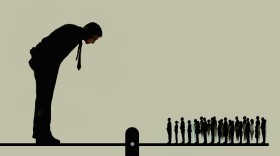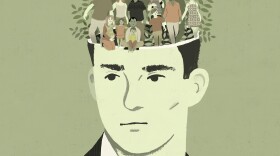
Jennifer Schmidt
Jennifer Schmidt is a senior producer for Hidden Brain. She is responsible for crafting the complex stories that are told on the show. She researches, writes, gathers field tape, and develops story structures. Some highlights of her work on Hidden Brain include episodes about the causes of the #MeToo movement, how diversity drives creativity, and the complex psychology of addiction.
Since joining NPR in January 2014, Schmidt has also worked as an editor on Morning Edition and All Things Considered. She has put together pieces for various news desks, including a story about survivor goats from the California wildfires for NPR's health blog Shots and a piece on a new trend in C-sections in which women can watch their babies being born which aired on Morning Edition.
The recipient of numerous journalism awards, Schmidt has been awarded a PRNDI for feature reporting, a National Headliners award for breaking news, a silver CINDY, an EMMA for editing, and various other awards from the RTNDA, the Associated Press, and the Society of Professional Journalists.
Schmidt's reporting has taken her across both the country and the world, from KPLU in Seattle and WBUR in Boston to freelancing in South Africa and Mexico. After living abroad for almost a decade, Schmidt now lives on a small farm near the Chesapeake Bay with a menagerie of animals including a one-eyed cat from South Africa, chickens, horses, two dogs from Mexico City, and goats.
Schmidt graduated magna cum laude with a B.A. from Middlebury College and an M.S. from the Medill School of Journalism at Northwestern University.
-
A virus is more than a biological organism. It's a social organism. Historian Nancy Bristow shares the lessons about human behavior that we can take away from a century-old pandemic.
-
Last week, we spoke with psychologist Sheldon Solomon about the fear of death and how it shapes our actions. This week, we pivot from psychology and politics to religion and history as we explore how people have tried to resolve these fears. We talk with philosopher Stephen Cave about the ways we assure ourselves that death is not really the end.
-
Death may be inescapable, but we do our best to avoid thinking about it. Psychologist Sheldon Solomon says we're not very successful though. This week on Hidden Brain, we confront how death anxiety courses through our actions, even when we don't realize it.
-
Social media sites offer quick and easy ways to share ideas, crack jokes, find old friends. But the things we post don't go away. We explore how one teenager's social media posts destroyed an opportunity he'd worked for all his life.
-
We all know the downsides of being poor. But what about the downsides of being rich? This week, we explore the psychology of scarcity...and excess.
-
Decades ago, a group of women accused a prominent playwright of sexual misconduct. For the most part, the complaints went nowhere. In 2017, more women came forward. This time, people listened.
-
This week on Hidden Brain's radio show, we tackle a big topic: power. From our conflicted feelings toward the powerful, to the ways we gain and lose power ourselves, and how power can corrupt.
-
Violent crimes committed by Muslims are much more likely to be reported as "terrorism." And that has disturbing consequences for the way Muslims are perceived.
-
A culture of racism can infect us all. On this week's radio show, we discuss the implicit biases we carry that have been forged by the society around us.
-
Young people have always used language in new ways, and it has always driven older people crazy. But the linguist John McWhorter says all the LOLs are part of an inevitable evolution of language.








